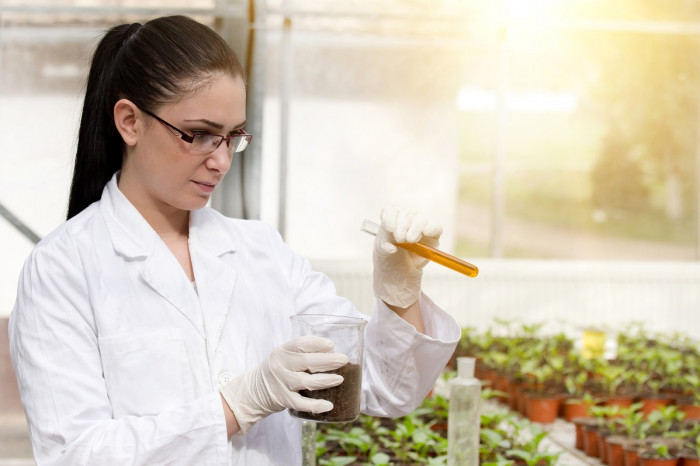Agricultural/Horticultural Scientist
Kaipūtaiao Ahuwhenua
Alternative titles for this job
Agricultural/horticultural scientists study farm animals, soils, pastures and crops to improve growth, health and quality, and to prevent pests and disease.
Pay
Graduate agricultural/horticultural scientists usually earn
$65K-$75K per year
Senior agricultural/horticultural scientists usually earn
$80K-$150K per year
Source: AgResearch, 2019.
Job opportunities
Pay
Pay for agricultural/horticultural scientists varies depending on qualifications, experience, and the type of work they do.
- Graduates with a Doctorate usually earn $65,000 to $75,000 a year.
- After three to five years, agricultural/horticultural scientists usually earn $75,000 to $90,000.
- Senior agricultural/horticultural scientists may earn $80,000 to $150,000.
Source: AgResearch, 2019.
(This information is a guide only. Find out more about the sources of our pay information)
What you will do
Agricultural/horticultural scientists may do some or all of the following:
- research and advise on animal or plant diseases, pest control, and chemical use
- develop better methods of managing farms and orchards
- study the effects of agriculture and horticulture on the environment
- oversee new projects and field research
- research and write reports based on field study, and present results
- share research findings with other scientists, companies and government agencies
- write applications for research funding and manage budgets
- train and supervise lab technicians, research teams and field workers
- make sure all scientific work meets legal requirements.
Some days I might be out in the field collecting samples and taking these back to the lab for analysis. Other days might involve planning projects and interpreting results on my computer.

Nicole Schon
Soil Scientist
Skills and knowledge
Agricultural/horticultural scientists need to have:
- a high level of scientific knowledge, especially in biology and chemistry
- knowledge of crops, pastures, soil types and farm animals
- knowledge of agricultural and horticultural chemicals, pests and diseases
- technical skills for performing experiments and operating scientific equipment.
Working conditions
Agricultural/horticultural scientists:
- usually work regular business hours. They may work irregular or longer hours when doing fieldwork and research
- work in offices, laboratories and glasshouses, and on farms, orchards and nurseries
- may travel locally to talk to farmers and growers, and overseas to attend conferences or work on international research projects.
What's the job really like?

Nicole Schon
Soil Scientist
How did you start your career as a soil scientist?
"I grew up on a dairy farm in the Waikato, and always had an interest in science. After leaving school, I completed a Bachelor of Science with Honours and then went on to do my PhD at Massey University.
"It wasn't until I was at university looking for a project as part of my Honours degree, that I really became interested in how the soil – including its biology – is influenced by agricultural management."
What do you like about your job?
"I like the diversity my role gives me – every day is different.
"Some days I might be out in the field collecting samples and taking these back to the lab for analysis. Other days might involve planning projects and interpreting results on my computer, or attending and presenting at conferences and workshops."
What gives you a sense of achievement in your role?
"I get satisfaction from projects that help farmers understand the benefits of healthy soils. I conducted a farmer-led earthworm survey, which involved being on a stand at the Mystery Creek Fieldays. Interacting with farmers and the public was a real highlight."
Agricultural/horticultural scientist video
Jamie Macalister talks about his role as an associate cereal breeder at Plant & Food Research – 2.05 mins.
I'm Jamie McAllister and I'm a serial breeder at Plant and Food Research. We breed a whole range of crops from fruits to vegetables to cereals. Our big goal is producing sustainable, high-value products that farmers can grow profitably and sustainably.
So for my work, lab and field environments are really well integrated.
Being able to have our plots in the field means we can grow our wheats and cereals in a representative environment of a farm.
I think the coolest aspect of applying technologies day to day at Plant and Food, we're kind of writing the book on how to apply it. Paired with the lab, we can start looking at genetic controls.
The glasshouse that we use at Plant and Food Research is kind of where the whole breeding process begins. In the field it takes a year from planting to harvesting to get seed. But in the glasshouse we can shorten that to around three or four months.
Without new developments and technologies we could never have been able to look at the things we look at now. I think Food Sciences is a hugely important area, particularly for younger people.
Global population is growing exponentially. We have only a limited amount of land in the world. The only way we're going to be able to feed people sustainably is if we the innovative and apply new technologies to solving these huge problems that we're going to have in the future. It's gonna take motivated, innovative young people that come through and to focus on achieving that.
Entry requirements
To become an agricultural/horticultural scientist, you need a Doctorate in science in an area such as:
- agricultural science
- microbiology
- biochemistry.
Agricultural/horticultural scientists in research positions usually apply for a postdoctoral fellowship after completing a Doctorate.
You may need to do two or three postdoctoral fellowships (usually lasting two or three years each) before getting a permanent scientist position.
Secondary education
A tertiary entrance qualification is required to enter further training.
Useful subjects include maths (especially statistics), chemistry, biology, and agricultural and horticultural science.
Personal requirements
Agricultural/horticultural scientists need to be:
- accurate
- observant
- organised
- decisive
- good at solving problems
- good at communicating
- practical
- able to work well alone and in a team.
Useful experience
Useful experience for agricultural/horticultural scientists includes:
- experience in a laboratory
- academic, scientific, or industry research
- any work in science or agriculture.
Physical requirements
Agricultural/horticultural scientists need to be reasonably fit as they lift and carry equipment during fieldwork.
They also need to have good eyesight (with or without corrective lenses) for laboratory work.
Check out related courses
What are the chances of getting a job?
Good demand for agricultural/horticultural scientists
Growing demand means opportunities for agricultural/horticultural scientists are good.
According to the Ministry of Business, Innovation and Employment, the amount of work for scientists has been increasing. It is expected to grow significantly to 2023, and then continue growing at 1.8% per year to 2028.
According to the Census, 714 agricultural/horticultural scientists worked in New Zealand in 2018.
Increased funding means more jobs for agricultural/horticultural scientists
In the 2019 Budget, the Government announced increased funding for some primary sector areas. As a result, opportunities for agricultural/horticultural scientists are best in:
- animal welfare
- biosecurity
- environment and conservation
- food safety
- sustainable land use.
Chances in these areas are particularly good for agricultural/horticultural scientists with experience in:
- analysing and monitoring climate and environmental conditions
- producing research and reports that inform government policy and legislation
- researching and monitoring sustainable land and water use
- scientific development, research and innovation projects.
Demand is strongest for scientists who specialise in environmental research.
Types of employers varied
Agricultural/horticultural scientists may work for:
- agricultural and horticultural equipment suppliers
- animal and plant feed developers and manufacturers
- chemical companies producing fertilisers and similar products
- consultancy companies – for example, those doing environmental assessments for resource consents
- government departments and local councils
- universities and research institutes.
Sources
- Chapman, M, 'Putting the Tomorrow in Tomorrow's Schools', 29 April 2019, (www.hortnz.co.nz).
- Dalziel, P, et al, 'The New Zealand Food and Fibre Sector: A Situational Analysis', December 2018, (www.mpi.govt.nz).
- Daniel, M, 'Eyeing up Ag's Opportunities', Rural News, 9 October 2019, (www.ruralnewsgroup.co.nz).
- Edlin, B, 'Research Funding to Provide Help for Farmers to Meet Climate Challenges', accessed November 2019, (agscience.org.nz).
- Hutching, G, 'Primary Sector Budget Funds Focus on Environmental Protection', Stuff, 30 May 2019, (www.stuff.co.nz).
- Kilmister, S, 'Government Announces Plan to Get More Skilled Workers Into Primary Industries', Stuff, October 2019, (www.stuff.co.nz).
- Macdonald, A, HR co-ordinator, AgResearch, careers.govt.nz interview, October 2019.
- Ministry of Business, Innovation and Employment, 'Medium to Long-term Employment Projections: Looking Ahead to 2028', August 2019, (www.mbie.govt.nz).
- Ministry for Primary Industries, 'Growing Our Future', 27 June 2019, (www.mpi.govt.nz).
- Ministry for Primary Industries, 'Situation and Outlook for Primary Industries', accessed October 2019, (www.mpi.govt.nz).
- New Zealand Government, 'Plan to Strengthen Primary Sector Workforce' (media release), 29 October 2019, (www.beehive.govt.nz).
- New Zealand Government, 'Transforming the Economy' (media release), 30 May 2019, (www.beehive.govt.nz).
- Rae, S, 'Focus on a High-Value Future', Otago Daily Times, July 2019, (www.odt.co.nz).
- Rural News Group, 'Investors Hopping Into Horticulture’, 13 September 2019, (www.ruralnewsgroup.co.nz).
- Skerrett, A, 'Farmers Welcome Details From Budget Funding', Newshub, 13 June 2019, (www.newshub.co.nz).
- Stats NZ, '2018 Census Data', 2019.
- Tipa, P, 'Hort's Star Keeps Rising', Rural News, 5 November 2019, (www.ruralnewsgroup.co.nz).
(This information is a guide only. Find out more about the sources of our job opportunities information)
Progression and specialisations
Agricultural/horticultural scientists in research positions usually:
- apply for a postdoctoral fellowship after completing a Doctorate
- complete two or three postdoctoral fellowships (usually lasting two or three years each), before getting a permanent scientist position
- progress into senior research scientist, team leader, or managerial roles after they have about 15 years of experience.
Agricultural/horticultural scientists can specialise in a number of roles, including:
- Agricultural Biotechnologist
- Agricultural biotechnologists use techniques, such as genetic engineering, to improve the quality and diversity of plant and animal products.
- Agricultural Entomologist
- Agricultural entomologists investigate the causes of insect outbreaks, and research ways to control them through biological pest management and chemical processes.
- Agricultural Microbiologist
- Agricultural microbiologists identify and control plant and animal disease. They often work in specialised areas such as food technology or environmental management.
- Agronomist
- Agronomists advise farmers and growers on best agricultural practice, including how to increase crop yield and farming profits.
- Animal Scientist
- Animal scientists research and study the genetics, nutrition, reproduction, growth, and development of domestic farm animals.
- Crop Physiologist
- Crop physiologists study plant growth and the effects of environmental conditions and chemicals on crops.
- Environmental Scientist
- Environmental scientists study the environment and how plants, animals and other living things are affected by it. They also study external influences, such as pollutants, and advise how to reduce their harmful effects.
- Horticultural Scientist
- Horticultural scientists study the growth and development of plants and crops, including vegetables and fruits.
- Soil Scientist
- Soil scientists study the physical, chemical, and biological characteristics of soils to work out the most effective planting methods.
Last updated 6 May 2021


